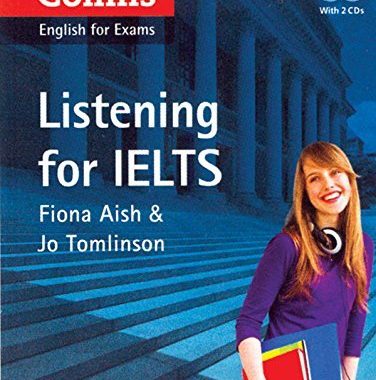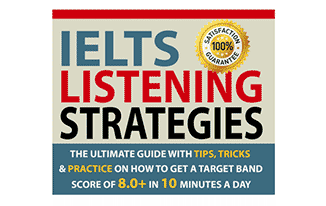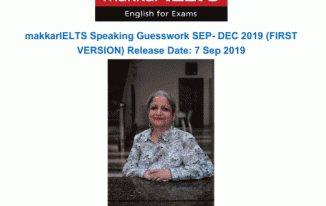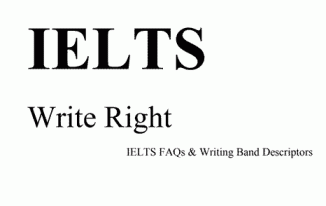Collin’s IELTS Listening, Reading, Writing, and Speaking ebook will prepare you for the IELTS test whether you are taking the test for the first time, or re-sitting the test. Vocabulary for IELTS ebook also helps you improve your vocabulary IELTS exam preparation. You can use the book to study on your own or as supplementary material for IELTS preparation classes. All ebooks have been written for learners with band score 5-5.5 who are trying to achieve band score 6.5 or higher.
Collins Listening For IELTS
Collins Listening For IELTS is divided into 12 units. Each unit focuses on a topic area that you are likely to meet in the IELTS exam. This helps you to build up a bank of vocabulary and ideas related to a variety of the topics.
Units 1-11 cover the key types of questions that you find in the IELTS listening test. Every exercise is relevant to the test. The aims listed at the start of each unit specify the key skills, techniques and language covered in the unit. You work towards Unit 12, which provides a final practice IELTS listening test.
Additionally, the book provides examination strategies telling you what to expect and how best to succeed in the test. Exam information is presented in clear, easy-to-read chunks. ‘Exam tips’ in each unit highlight essential exam techniques and can be rapidly reviewed at a glance.
Answer key of listening:
A comprehensive answer key is provided for all sections of the book including notes on why certain answers are correct or incorrect. You will also find full audio scripts of all listening exercises at the back of the book. The answers are underlined in the audio scripts so you can see where the correct answers come in the audio.
Collins Reading For IELTS
Collins Reading For IELTS is divided into 12 units. Each unit focuses on a topic area that you are likely to meet in the IELTS exam. This helps you to build up a bank of vocabulary and ideas related to a variety of the topics. As in the IELTS test, the texts are taken from authentic sources. These may contain narratives, logical arguments, descriptions or discussions. Some of texts contain visuals.
Units 1-11 cover the types of question that you will see in the IELTS test. Each unit focuses on a particular type of question, for example, matching questions, short-answer questions, completion questions, multiple choice, questions asking you to identify information or identify writers’ views or claims.
The exercises in the unit are relevant to the test. The aims listed at the start of each unit specify the key skills, techniques and language covered in the unit. You work towards Unit 12, which provides a final practice IELTS reading test.
Additionally, the book provides examination strategies telling you what to expect and how best to succeed in the test. Exam information is presented in clear, easy-to-read chunks. ‘Exam tips’ in each unit highlight essential exam techniques and can be rapidly reviewed at a glance.
Collins Writing For IELTS
Collins Writing For IELTS is divided into 12 units. Each unit focuses on a topic area that you are likely to meet in the IELTS exam. This helps you to build up a bank of vocabulary and ideas related to a variety of the topics.
Units 1-11 cover the key stages of the writing process: everything from analyzing the task to proof-reading a completed response. Every exercise is relevant to the test. The aims listed at the start of each unit specify the key skills, techniques and language covered in the unit. You work towards Unit 12, which provides a final practice IELTS writing test.
Additionally, the book provides examination strategies telling you what to expect and how best to succeed in the test. Exam information is presented in clear, easy-to-read chunks. ‘Exam tips’ in each unit highlight essential exam techniques and can be rapidly reviewed at a glance.
Answer key of Writing
A comprehensive answer key is provided for all sections of the book including recommended answers and explanations for more open-ended writing tasks. There are model answers for all of the writing questions. For one of the practice exam questions in each unit, two model answers are given – one of them annotated. This shows you that a variety of approaches to each writing task can be taken.
Collins Speaking For IELTS
Collins Speaking For IELTS is divided into 12 units. Each unit focuses on a topic area that you are likely to meet in the IELTS exam. This helps you to build up a bank of vocabulary and ideas related to a variety of the topics.
Units 1-11 cover vocabulary, grammar, pronunciation and exam techniques to prepare you for the IELTS speaking test. Every exercise is relevant to the test. The aims listed at the start of each unit specify the key skills, techniques and language covered in the unit. You work towards Unit 12, which provides a final practice IELTS speaking test.
Additionally, the book provides examination strategies telling you what to expect and how best to succeed in the test. Exam information is presented in clear, easy-to-read chunks. ‘Exam tips’ in each unit highlight essential exam techniques and can be rapidly reviewed at a glance.
Answer key of Speaking
A comprehensive answer key is provided for all sections of the book including recommended answers and explanations. You will also find full audio scripts of all speaking exercises at the back of the book. There are sample answers for all the IELTS speaking test questions recorded on the CDs. The audio scripts for these sample answers are also at the back of the book. Listening to and learning from these will help you to achieve the best scores.
Collins Vocabulary For IELTS
Collins Vocabulary for IELTS book and CD cover vocabulary items and skills which are relevant to all four exam papers: Listening, Reading, Writing and Speaking. In each unit, you work towards an exam practice exercise which is modeled on the actual IELTS exam. Each unit contains activities that help you develop, step-by-step, the vocabulary knowledge and skills to help you tackle the exam. Exam tips throughout the book highlight essential vocabulary-related learning strategies and exam techniques.
Answer key:
A comprehensive answer key is provided for all sections of the book including model answers for more open-ended writing and speaking tasks.
Collocations:
At the back of the book, you can further develop your vocabulary by studying the list of the most common collocations for the vocabulary presented in the units.
How to use this book:
The book is divided into 20 units. Units 1-9 cover vocabulary for topics that frequently appear in the exam, such as health and education. Units 11-19 cover words for general functions, such as describing problems and solutions. Units 10 and 20 provide revision exercises. Unit 10 revises the vocabulary and skills covered in Units 1-9, and Unit 20 revises the vocabulary and skills covered in Units 11-19. All 20 units help you develop skills such as paraphrasing and working out the meaning of unfamiliar words from context.
Each unit is self-contained so that you can study the units in any order. You can choose the unit you want to study either by selecting the topic you want to study, or by selecting which exam paper you want to practice. Only the units with practice on the Speaking and Listening papers contain audio. The contents pages at the beginning of the book provide an overview of what is in each unit so you can use this to choose which units you would like to study first. These pages also give you information on which units contain audio.
You will probably find it helpful to begin each unit by reading the vocabulary items in part 1, then working through the exercises in preparation for the exam practice exercise at the end. Try to do the exam exercises within the time limit to give yourself realistic exam practice.
In order to learn a new word, it is usually necessary to revisit it several times. The revision units help you to do this. However, it is also a good idea to avoid writing your answers in the book so that you can do the exercises again at a later date.
It is also advisable to keep a vocabulary notebook. Knowing a word and how to use it involves understanding many aspects of it. The more information you can record about the words you are learning, the more useful it will be. Key definitions, parts of speech, common collocations and example sentences are all very helpful. Don’t forget to use the Collocations section at the back of the book to help with this.
Getting well-informed feedback on your writing and speaking exam practice exercises would also be an advantage. However, if this is not possible it is still important to do the exercises in full. Studying model answers can help you develop the ability to assess your own work. If possible, record yourself when speaking, and listen carefully to your performance. Avoid memorizing model answers. Remember that in the actual exam, it is important to answer the question and not just speak or write about the topic
As a final preparation before the exam, you could re-read the exam tips in the boxes. This will remind you of the strategies for success in the exam.
Related IELTS Resources
Take a practice test to find out what is your current weakness in terms of IELTS scale and allow more time to improve your weak spots. The following IELTS resources will help you to develop your skills faster:




